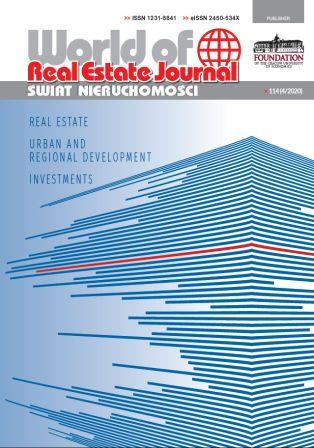Urban Regeneration – a Financial and Material Approach. The Scale of Financial Needs in Regeneration Processes
Urban Regeneration – a Financial and Material Approach. The Scale of Financial Needs in Regeneration Processes
Author(s): Katarzyna OlbińskaSubject(s): Business Economy / Management, Rural and urban sociology, EU-Approach / EU-Accession / EU-Development, Public Finances, Fiscal Politics / Budgeting
Published by: Fundacja Uniwersytetu Ekonomicznego w Krakowie
Keywords: Urban regeneration; regeneration costs; regeneration scale; regeneration programming; EU funding;
Summary/Abstract: Purpose – The research problem presented in the paper concerns the scale of regeneration needs in the largest cities in Poland. The aim of the conducted research was an attempt to identify the extent of these needs as well as to review and compare the scale of planned urban regeneration projects in financial and material quantitative) terms. Design/methodology/approach – The research area represents the eleven largest cities in Poland in terms of population. The time frame covers current urban regeneration programmes created since 2015, enacted or updated by the end of August 2019. To achieve the objectives of the study, the following methods of data collection were used: a literature review, desk research and, the free-format interview. For data analysis, desk research and comparative analysis methods were used. Findings – The total value of the projects planned in the eleven studied cities exceeded PLN 14 billion. The value of regeneration needs in Polish cities was estimated at PLN 50.7 billion. The intensity of activities planned in the cities surveyed in the years 2015-2020+ is more than three times higher than that planned in the largest cities (more than 200,000 inhabitants) in the 2007-2013 financial framework. However, the scale of the intervention may still be insufficient. At the same time, the scope of planned actions may exceed the real financial capacity of some cities, resulting in the partial implementation of the urban regeneration process and the achievement of only fragmentary changes described as islands of renewal. Research implications – The analyses carried out show a clear relationship between the availability of EU funds and the scale of planned regeneration activities, as well as the dominance of investment activities in most of the studied cities. Furthermore, it can be said that the problem identified in previous programming periods, i.e. covering with programmes too large urban areas, has not been resolved.
Journal: Świat Nieruchomości
- Issue Year: 1/2020
- Issue No: 111
- Page Range: 33-58
- Page Count: 26
- Language: English

